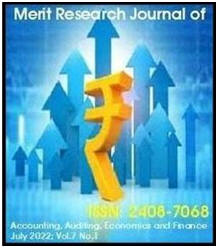
|
|
|
|
|
|
/ / MRJAAEF Home / / About MRJAAEF / / Submit Manuscripts / / Call For Articles / / Editorial Board / / Archive / / Author's Guide / /
|
Other viewing option
Other links:
|
Original Research Article The Impact of Government Expenditures on Economic Growth in Nigeria using VAR Approach |
|||
|
Damilola Temitope Oke1, Moses C. Ekperiware1*, John A. Oyetade2, Adeyinka Adewusi1 |
||||
|
1Caleb
University, Lagos State, Nigeria
Received: 05 June 2022
I Accepted:
24 July 2022
I Published:
29 July 2022
I
Article ID: MRJAAEF22010 |
||||
|
Abstract |
||||
|
The study
established the nexus between economic growth, government
expenditure, and debt in Nigeria. The increased borrowing in the
midst of dwindling economic progress with a huge spending
paradox is the trust of this study. Can fiscal spending help
place the nation on a progress path with government debt and its
servicing in Nigeria? Finding answers motivates this study. The
study used data from 1981 to 2020 with VAR pairwise granger
causality analysis. The finding of the VAR test shows a
substantial positive link between government capital and
recurrent spending and public debt in the Nigerian economy. The
Wald test result demonstrates that there is a unidirectional
causal relationship between state debt in Nigeria and both
capital and recurrent expenditures. This conclusion has the
apparent inference that Nigerian government borrowing is caused
by budget deficits, a circumstance that is well-known in Nigeria
at both the federal and state levels. In order to ensure that
our budgeting system achieves allocative efficiency and that
borrowing to finance budget deficits must be done objectively
and realistically, it becomes important to reassess the
government budgeting process. This study therefore suggests that
planning-programming-budgeting systems (PPBS) and zero-based
budgeting (ZBB) be implemented in place of the incremental
budgeting (IB) that is currently used at the federal and state
levels of government, which is the current global practice,
given that these budgeting approaches aim to increase
competition for budgetary resources and thereby support the
achievement of government fiscal policy goals in the economy. |
Merit Research Journals© 2021 || Advertisement | Privacy policy.
